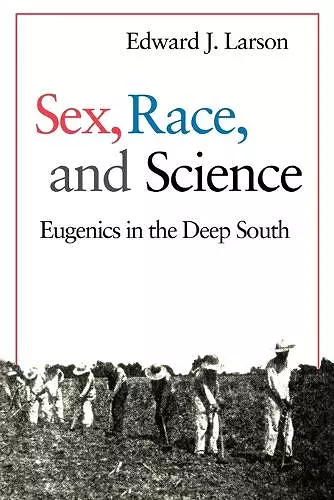Sex, Race, and Science
Eugenics in the Deep South
Format:Paperback
Publisher:Johns Hopkins University Press
Published:11th Oct '96
Currently unavailable, and unfortunately no date known when it will be back

In the first book to explore the theory and practice of eugenics in the American South, Larson shows how the quest for "strong bloodlines"expressed itself in state laws and public policies from the Progressive Era through World War II.
Larson shows how the seemingly broad-based eugenics movement was in fact a series of distinct campaigns by small groups of determined individuals for legislation at the state level.In the first book to explore the theory and practice of eugenics in the American South, Edward J. Larson shows how the quest for "strong bloodlines"expressed itself in state laws and public policies from the Progressive Era through World War II. Larson shows how the seemingly broad-based eugenics movement was in fact a series of distinct campaigns by small groups of determined individuals for legislation at the state level.
In prose as lean as it is graceful, historian Edward J. Larson of the University of Georgia provides in this work a highly illuminating account of the eugenics movement in Georgia and the five other deep South states (Alabama, Florida, Lousiana, Missippi, and South Carolina). -- Williard B. Gatewood Georgia Historical Quarterly Edward Larson's study of the eugenic's movement in the Deep South is the most comprehensive examination to date of how eugenic science transplanted into social policy. -- Molly Ladd-Taylor Journal of Southern History Larson's book will take its place beside Jim Jone's ground-breaking Bad Blood , the history of the Tuskegee syphillis experiment, as an example of how well-intentioned, progressive, scientistis and 'reformers' can misuse medicine. It is a model of thorough scholarship, creative analysis, and graceful writing, and it is as non-polemical as a book can be on such a disturbing subject. -- Wayne Flynt Florida Historical Quarterly Larson's thoughtful analysis of issues involved when the state intervenes in the reproductive decisions of its citizens is both timely and persuasive. -- Susan E. Ledert Journal of American History Larson's book, the first tp focus particularily on the South, is also the first to provide a sustained view of eugenics policy-making. Larson discusses the source of eugenic ideas, the processes by which eugenicists lobbied for the laws, and the content of eugenics legislation. He also assseses the effects of such laws and factors that led to their eventual repeal. This study should stimulate and guide similar investigations of eugenics policy in other parts of the country. -- Nicole Hahn Rafter History of Education Quarterly Physicians and historians will be richly rewarded by reading Larson's account of this region's eugenic practices and his admirable restraint from bootless moralizing. His values-respect for human rights and equality-are clearly stated in the last section, but his restraint in the text prods readers to draw their own conclusions. -- John C. Fletcher New England Journal of Medicine Analyzing eugenic reforms in the context of state policies, Larson's detailed and interesting study suggests that the [eugenics] movement did not necessarily follow the same pattern throughout the United States, but rather reflected the culture and history of particular regions. His concerns are particularly salient these days when books like The Bell Curve are claiming that science supports concerns about the risk of degeneracy and the threats posed by 'dysgenic practices.'. -- Dorothy Nelken Journal of the American Medical Association Required reading for all policy-makers called upon to tackle the complex issues integral to the applications of genetics to humans. -- Willard B. Gatewood Georgia Historical Quarterly Sex, Race and Science is meticulously researched. It will undoubtedly be seen as the major resource on the history of involuntary sterilization laws in this region for a long time. -- Philip Reilly Medical Humanities Review
ISBN: 9780801855115
Dimensions: unknown
Weight: 363g
264 pages